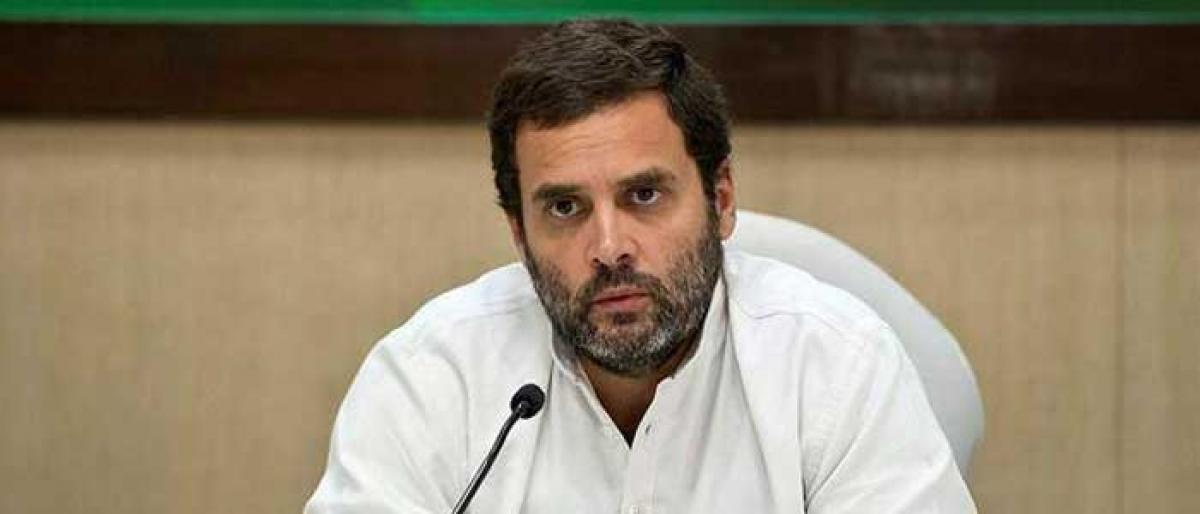Live
- Apple Removes WhatsApp and Threads from its Store in China; Details
- Amid flood of complaints, 50.96 pc turnout in Bengal's three LS seats till 1 pm
- BJP expecting its 'best show in South' on back of PM Modi's popularity, says HM Amit Shah
- Mahabubnagar MP Seat Witnesses Intense Competition among Congress, BJP, and BRS Candidates
- 150 Families from YSRCP Join TDP in Tanakallu Mandal
- Special prayers offered at Dargah during Keshineni Chinni's Nomination
- Dell launches AI-powered commercial PC portfolio in India
- Maha: 5 Vidarbha constituencies records 32.36 pc polling till 1 pm
- Congress, CPI-M not part of INDIA bloc in Bengal: Mamata Banerjee
- Madhubani Saree: The epitome of traditional elegance and modern beauty
Just In

The remarks by the Congress scion on dynasties in India continue to reverberate. It is true that South Asian politics are characterised by the phenomenon of dynasties. The justification for this malaise is that after all, the dynasty can only be an initial advantage and one has to prove oneself at the hustings. The people’s mandate, it is argued, would absolve one of any such criticism.
The remarks by the Congress scion on dynasties in India continue to reverberate. It is true that South Asian politics are characterised by the phenomenon of dynasties. The justification for this malaise is that after all, the dynasty can only be an initial advantage and one has to prove oneself at the hustings. The people’s mandate, it is argued, would absolve one of any such criticism.
Instead of revolving round the personalities, it is important to analyse the factors that are responsible for such a state of affairs. Parties are increasingly woven around individual charisma of their leaders rather than driven by ideological commitment. Means justify the ends. Winnability is the factor. Persons belonging to influential political families have a connect with the people.
Indian society has long been sanctioning such a dynastic transition. The malignant polity needs a correction rather than easily blaming it on individuals. The emergence of regionalism in politics has further accentuated the trend towards dynastic politics. Political parties are reduced to proprietorial concerns. The internal democracy within the political parties is endangered. A conversation within the party is missing as coteries prevail over grassroots activists. Barring few exceptions on the right and the left of the Indian political spectra, dynastic control over the parties is a ubiquitous phenomenon.
However, even though the pedigree provides one with the initial advantage, the ability of the leader ultimately matters. There are examples of how leaders could carve out a place for themselves much superior to what the dynastic link could offer to them.
The politics continue to be the profession of chosen few. The criminalisation and commercialisation of politics is more responsible for this than the dynastic culture. The greater political participation of the people, increasing the democratic accountability can be the antidote for such an unhealthy trend in politics. Plurality is the feature of democracy. But, Indian democracy like many other western counterparts fail to offer to the people radically different alternatives. Such a homogenisation of polity also chokes the choice favoring chosen individuals leveraging their family lineage.
Electoral choices are increasingly being defined by parochial considerations like caste, region, money etc., rather than the issues that confront the society. Trivialisation of political discourse also contributes to the growing influence of dynasties in politics.
Indian cultural milieu somehow accepts and even glorifies such tradition of dynasties though this cannot be the justification for endorsing the trend. Dynastic politics, whatever may be the causes of its evolution and survival in Indian democracy, militates against the spirit of democracy and allows concentration of power in the hands of few families. It dissuades larger public participation in political process thereby showing a debilitating impact on the form and content of Indian democracy.
Increasing the polemical debate true to the India’s argumentative tradition, encouraging greater participation of youth and people from all walks of life in politics and public affairs, strengthening institutions of accountability and democratising the internal structures of political parties can be some useful measures to get India rid of the scourge of dynasties.

© 2024 Hyderabad Media House Limited/The Hans India. All rights reserved. Powered by hocalwire.com







